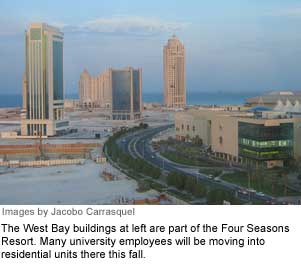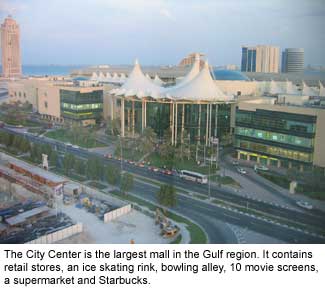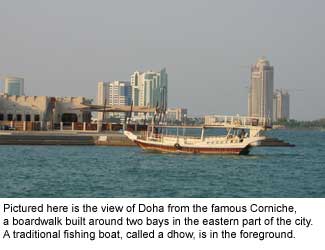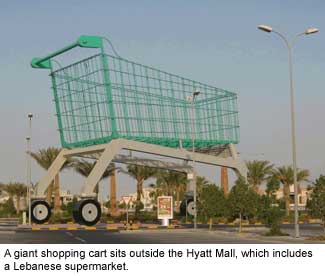“Daily life can be as exotic or ordinary as you'd like,” says Dean Charles Thorpe.
It's 110 degrees in the shade, but pleasantly less humid than summer in Pittsburgh. It's a place where you can shop at traditional markets called souqs, or head down the street to a modern superstore that's bigger than the average Sam's Club.
It's Carnegie Mellon University in Qatar , and 44 employees who have moved to this warm and friendly Arabian Gulf nation to establish the university’s first residential undergraduate campus outside of Pittsburgh are finding that daily life can be both exotic and as ordinary as a workday in Oakland.
“I was impressed by the wonderful juxtaposition of sand and water,” says Associate Dean for Academic and Student Affairs Robert Kail, who first encountered Qatar a year ago as part of a Carnegie Mellon "advance team" exploring the feasibility of creating the new campus.
“It's a very modern country,” says Kail, former longtime associate dean for the College of Engineering. “In many ways, in fact, downtown Doha puts Pittsburgh to shame.” He was surprised, he says, by the upscale malls and superstores in the downtown area. “We tend to think of malls in terms of the suburbs. But there are no suburbs in Doha. It's all city and desert.”
Getting settled in Qatar
Education City “is just off the edge of published maps of Doha, which makes for interesting navigation,” says Charles Thorpe, who stepped down as director of Carnegie Mellon’s Robotics Institute to become dean of the Qatar campus.
“Actually, driving here is a lot like driving in Pittsburgh,” Thorpe says. “There are seemingly no streets that run straight, there aren't street signs at a lot of the intersections, and people refer to places like ‘where the police headquarters used to be‘.”
Thorpe and his wife, Leslie, and teenaged children, Leland and Hannah, live in a residential area of Doha about 15 minutes from campus. They inhabit the top floor, while the bottom floor is used as an official Carnegie Mellon space for meetings and social gatherings.

Many other university employees are living in large luxury apartment complexes and villas, including Ruth Gaus, assistant to the dean, who moved to Qatar with her husband Robert this past June. “I'd never traveled outside the United States before, so it has been a real whirlwind of experiences,” she says.
Gaus lives in Riviera Gardens, “a beautiful compound surrounded by palm trees and gardens,” where she enjoys getting together with Carnegie Mellon neighbors to share tips for living in Qatar.
“Daily life here can be as exotic or ordinary as you'd like,” says Thorpe. “For example, there are the souqs, the traditional markets, that sell everything. There's a gold souq for jewelry, a tools souq for buying hammers and electric drills and that kind of thing, a spice souq, and even a used car souq. But you can also go to the City Center Mall, which has a well-stocked grocery store, ice skating rink, movie theaters and Starbucks.”
While Carnegie Mellon expatriates have had some time to spend exploring their new surroundings, they’ve also had to take care of several essentials, such as getting the required medical and eye exams for new residents as part of obtaining permanent resident status in Qatar. They also had to be fingerprinted.
Acquiring permanent resident status in Qatar is mandatory in order to buy or drive a car, or rent housing under your own name. To do that you need a visa, preferably one obtained beforehand.
“It may seem strange, but it is possible to enter Qatar without a visa,” says Jacobo Carrasquel, associate teaching professor and director of the Computer Science Program. “Some of my colleagues here on campus did that and then they had to be sent to a nearby country, such as Bahrain or the United Arab Emirates, to obtain a visa and reenter the country.”
Carrasquel, whose students have named him “Abu Yousif,” which means “father of Joseph,” says he had an advantage over others when it came to the physical exam. “It helps to know your height in centimeters and weight in kilograms,” he says.
Starting a university from scratch
Starting a university from scratch requires long hours of hard work, all while adjusting to academic and office life in a different culture.
Over the summer the pace has been probably best characterized as “full-tilt start-up mode,” says Lisa Kirchner, director of marketing and public relations for the Qatar campus. “Everyone has been wearing a lot of different hats to get things up and running.”
The first class of 44 freshmen, mostly from Qatar and other Middle Eastern nations, started classes on Aug. 29. The class is a mix of business (53 percent) and computer science students (47 percent).

The workweek in Qatar starts on Sunday, with Fridays and Saturdays off, and the seven-hour time difference (eight after daylight savings) means that communicating with Pittsburgh colleagues, by phone, email or videoconferencing, must be scheduled carefully to accommodate disparate schedules.
Although most of the residents of Doha speak some English well, the language barriers and other cultural differences can make some tasks, like ordering office supplies, more time-consuming than usual, says Edna Jackson, executive assistant to Provost Mark Kamlet. Jackson spent three months in Qatar earlier this year helping to get the new campus established.
“One of the biggest adjustments for most of us will be living in a culture where you don't speak the language or can’t read the writing,” says Kirchner, referring to the Aramaic script of Arabic.
Students will also have adjustments to make. Many Middle Eastern students are accustomed to separate classrooms for men and women.
“We've been asked to do things here the way we do things in Pittsburgh,” says Thorpe, “which means classes are being taught in English, and classes are fully co-ed.” Seventy-three percent of the new freshman class is female.

“Qatar is a wonderfully blended, moderate Islamic culture,” says Kail. “It's very tolerant and diverse.” He notes that unlike some other Middle Eastern nations, women can drive and hold many leadership positions throughout Qatari society.
Meeting People, Blending Cultures
“From our very earliest opportunities to interact with Qatari people, we've felt nothing but mutual respect, warmth and a genuine interest in having [Carnegie Mellon] here,” says Kail.
Thorpe agrees. “The great thing about this whole experience is the people. Carnegie Mellon has a great crew, including people from the Pittsburgh campus, added to other people from across the United States, plus people from Qatar and Bahrain and Oman and Australia and Sudan, and all over the world,” he says.
In addition to working with colleagues from a vast region, many Carnegie Mellon staffers are eager to make local acquaintances as well.

“I'm enjoying being part of a process that will bring together two very different cultures,” says Kail. “I don't have any illusions that this will change the world, but I do think there's a part that education can play, and the notion of being part of that at the most fundamental level is very appealing.”
“It's a major life change,” says Gaus, “but a great opportunity to move forward and experience a new challenge.”
Related Links:
Carnegie Mellon University in Qatar
College of Engineering
Charles Thorpe
Computer Science Program



